Key takeaways:
- Cooperative parenting emphasizes collaboration, open communication, and flexibility, which fosters emotional security in children.
- Sharing responsibilities and making joint decisions enhances parental well-being and supports a harmonious family dynamic.
- Despite challenges like differing opinions and imbalanced responsibilities, effective communication strategies can help navigate conflicts and strengthen parenting partnerships.
- Long-term, cooperative parenting instills essential social skills and emotional resilience in children, equipping them to build strong relationships in the future.
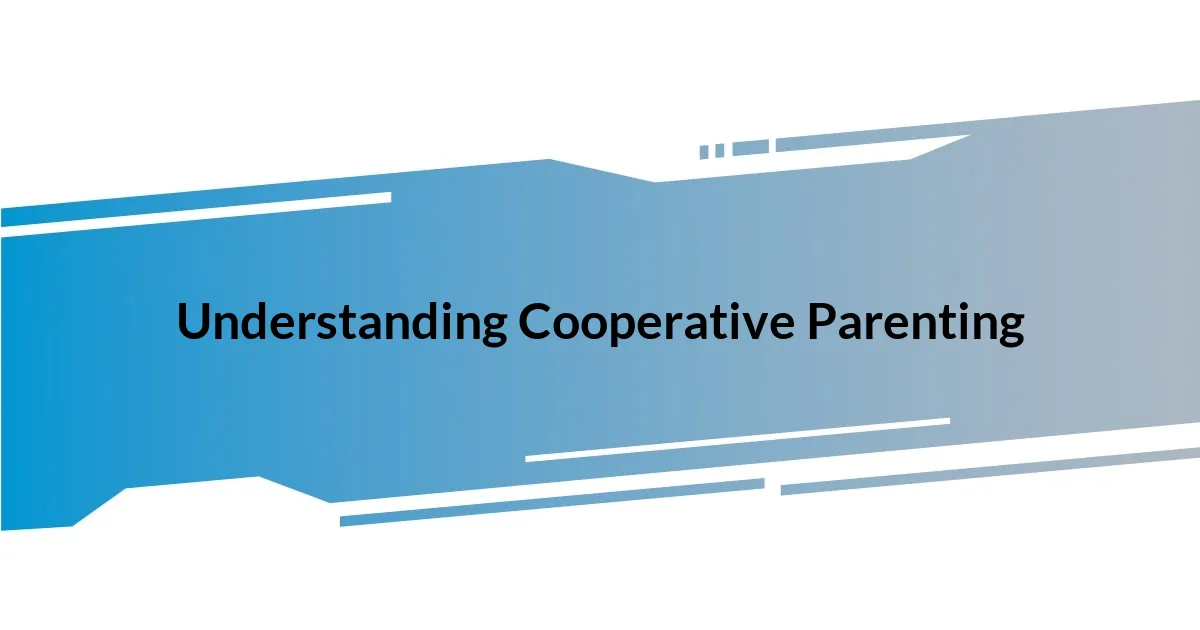
Understanding Cooperative Parenting
Cooperative parenting is all about collaboration between parents, fostering a healthy environment for children to thrive. I remember a time when my co-parent and I had conflicting ideas about discipline. This moment prompted a heartfelt conversation that deepened my understanding of cooperative parenting; we realized that our united front was essential for our children’s emotional security.
Engaging in cooperative parenting requires open communication and flexibility. I’ve found that it’s crucial to express feelings honestly yet sensitively; this not only preserves respect but also strengthens trust between partners. Have you ever considered how your own emotions influence your parenting? When I openly shared my fears, it paved the way for us to tackle challenges together, reinforcing that we’re truly a team.
One of the most rewarding aspects of cooperative parenting is seeing how it reflects in our children’s behavior. I’ve watched my kids learn to solve conflicts peacefully, an invaluable skill in today’s world. It’s a reminder that cooperative parenting is not just about managing schedules or responsibilities; it’s about nurturing a family culture where love, respect, and understanding are the guiding principles.
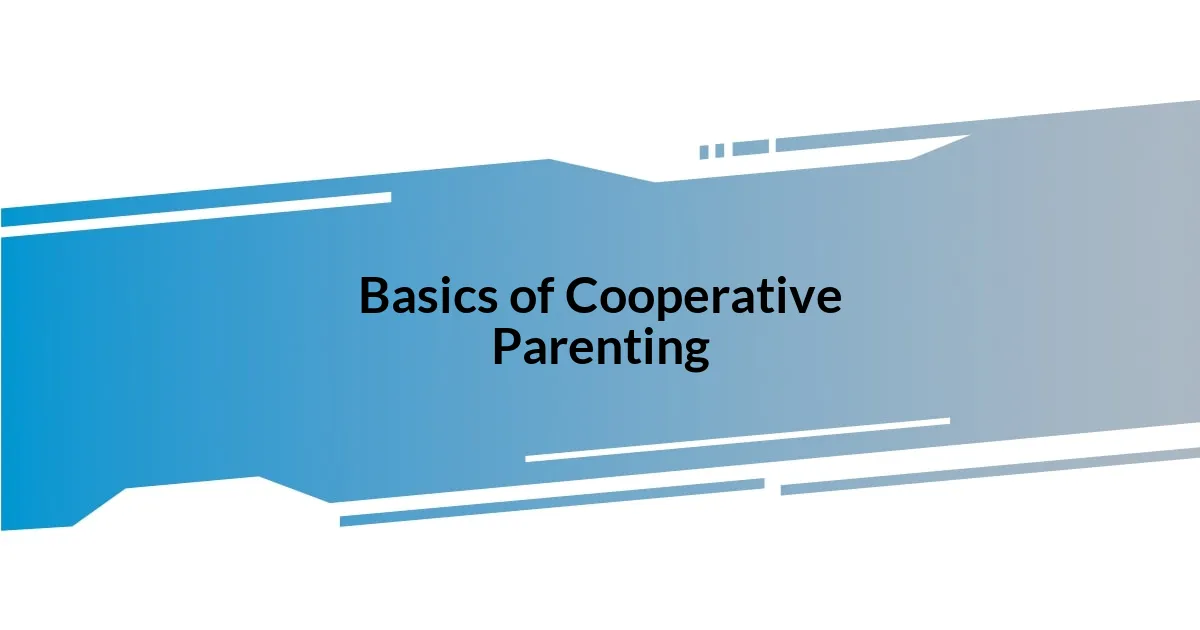
Basics of Cooperative Parenting
Cooperative parenting thrives on the principles of collaboration and mutual respect between parents. I vividly recall a time when my co-parent and I sat down during a tense week, both feeling overwhelmed. We took a moment to clear the air, realizing that prioritizing our children’s needs required us to be aligned, even when our views differed. This experience really underscored how cooperative parenting is less about compromising and more about understanding.
- Establish open lines of communication: Regularly check in with each other about feelings, expectations, and concerns.
- Stay flexible: Adapt to changes and be willing to adjust plans to meet the children’s needs and each other’s parenting styles.
- Share responsibilities: Divide parenting tasks to prevent burnout and build a sense of partnership.
- Make joint decisions: Whether it’s about schooling, discipline, or activities, collaborating ensures both parents feel involved.
- Show mutual respect: Always speak positively about each other in front of the kids; it reinforces their sense of security.
It’s amazing how such deliberate efforts create a stable family atmosphere. I can’t emphasize enough the impact of this approach; it inspires trust and teaches children that healthy relationships are key in any partnership.
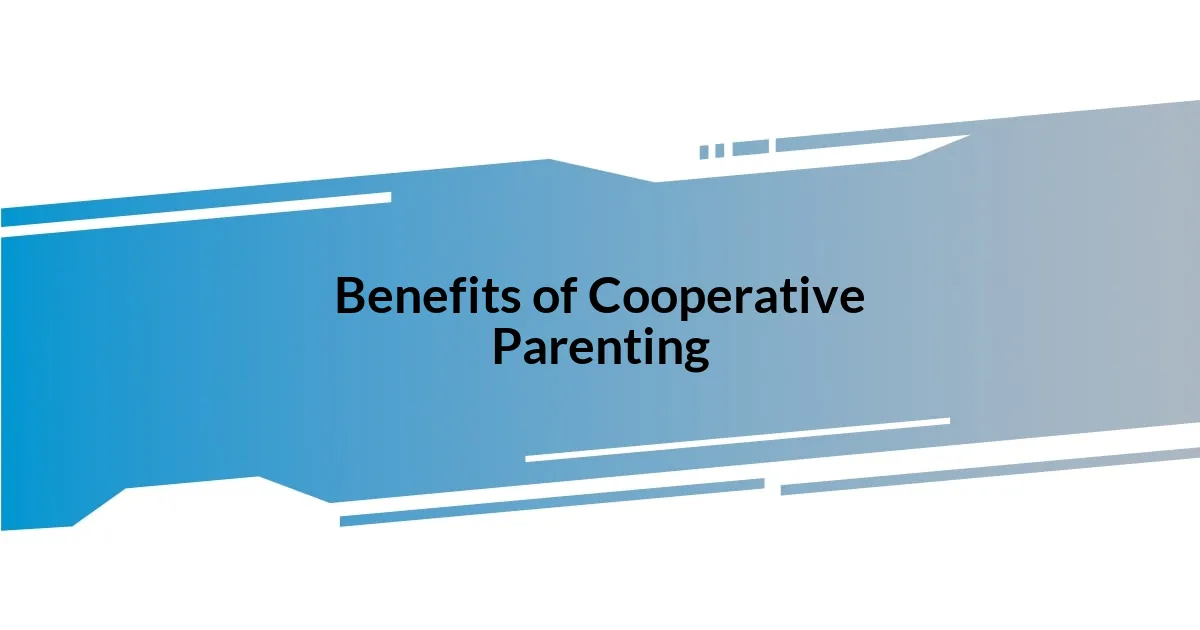
Benefits of Cooperative Parenting
Cooperative parenting brings numerous benefits, most notably fostering a sense of security in children. I can still recall a memorable weekend when my co-parent and I decided to combine our strengths in planning family activities. By blending our ideas, we not only delighted our kids with an unexpected adventure but also demonstrated that teamwork leads to joyful experiences. Seeing the excitement in their eyes reinforced my belief that when parents collaborate, it nurtures an environment where children feel loved and confident.
Another significant advantage of cooperative parenting is how it enhances parental well-being. As a parent, I’ve faced moments of sheer exhaustion, and I remember once feeling overwhelmed by juggling work and home responsibilities. However, our open dialogue allowed my co-parent and me to share the load effectively. This balance not only alleviated my stress but also nurtured our relationship, reminding me that shared parenting fosters emotional support for both parties. When both parents feel supported, the positive energy directly benefits the children, creating a harmonious family dynamic.
In addition to emotional support, cooperative parenting encourages children to develop crucial social skills. I’ve noticed that my kids are more adept at resolving disputes among themselves, a skill they picked up from witnessing constructive discussions between us. For instance, during a recent disagreement over sharing toys, they naturally navigated a resolution, echoing the respectful negotiations they’ve observed. It’s fascinating how cooperative parenting shapes their behavior, showing them that collaboration and understanding are fundamental not only at home but also in their interactions with the world.
| Benefit | Description |
|---|---|
| Emotional Security | Children feel secure when parents present a united front. |
| Parental Well-Being | Shared responsibilities alleviate stress and promote emotional support. |
| Social Skills Development | Children learn negotiation and conflict resolution through parental cooperation. |
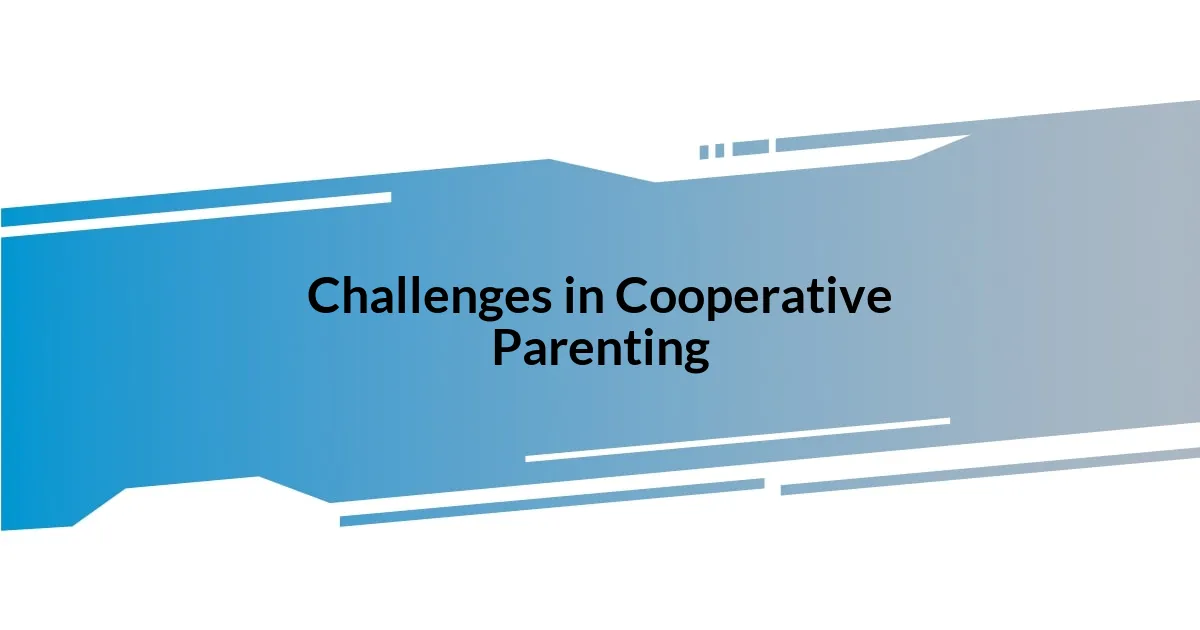
Challenges in Cooperative Parenting
Navigating the complexities of cooperative parenting often presents unique challenges that can leave one feeling drained. For instance, I remember a phase when my co-parent and I disagreed on our children’s screen time. Each of us held firm to our beliefs, and it felt like we were pulling in opposite directions. This situation made me question, “How can we effectively nurture a united front when our views are so different?” It took several heart-to-heart discussions, but eventually, we established some common ground, allowing us to make decisions that felt right for both of us and our children.
Balancing responsibilities can also become a source of frustration. I recall a particularly hectic week when my workload peaked, and I felt like I was drowning in tasks. Despite our agreements on distributing duties, there were times when one of us inadvertently took on more than the other. This imbalance led to moments of resentment, making me wonder if my co-parent understood how overwhelmed I truly felt. It was a reminder of the importance of frequent communication and reassessing our roles to ensure we both felt equally supported.
Lastly, there’s the emotional toll that disagreements can take on the children. I never forget the look of confusion on my child’s face during a tense moment when my co-parent and I had a dispute in front of them about discipline approaches. It struck me how vital it was to shield them from our conflicts. This experience emphasized to me that although we strive for cooperation, we must remain vigilant about the way our differences might impact our kids. How can we express our feelings without harming their sense of security? I learned that taking a step back during heated moments is crucial to maintaining their well-being while we navigate our own challenges.
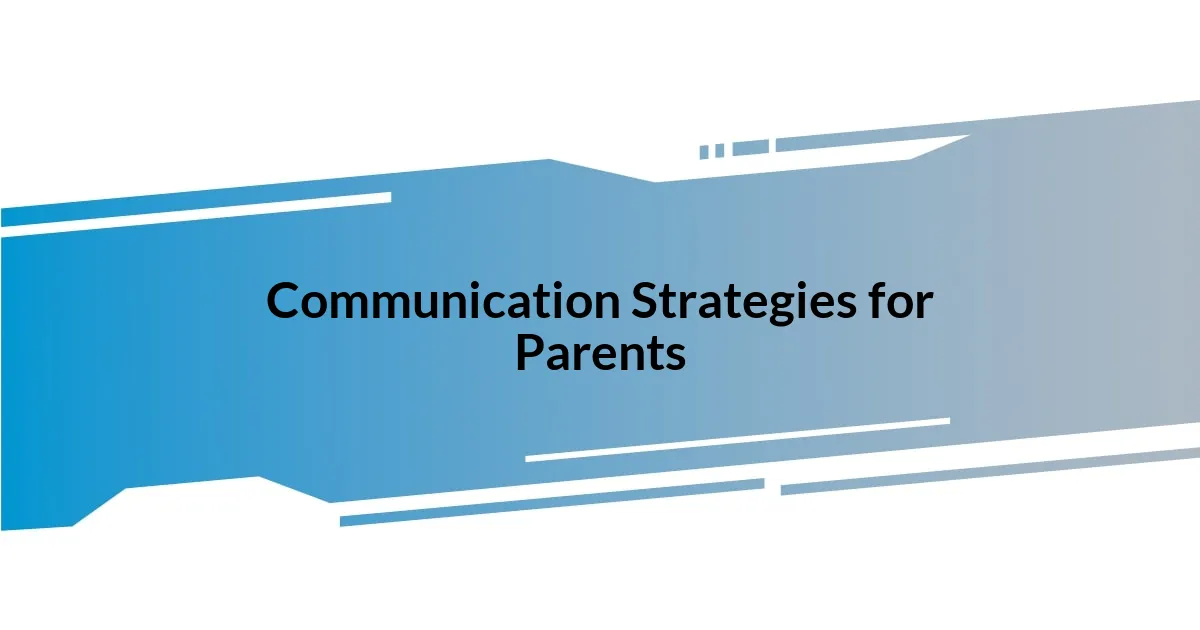
Communication Strategies for Parents
When it comes to communication, one strategy I’ve found invaluable is setting regular check-in times with my co-parent. For instance, we dedicated Sunday evenings to discuss how the week went and what might be on the horizon. This routine allowed us to share our thoughts openly without distractions and paved the way for honest conversations about our parenting strategies. It’s amazing how a simple commitment to listen and share can resolve potential misunderstandings before they escalate.
I think it’s also crucial to use “I” statements when discussing feelings. I remember a particularly tough day when I felt overwhelmed by the chaos in our home. Instead of pointing fingers, I expressed, “I feel stressed when the house is loud and busy,” which opened a dialogue rather than a debate. This shift not only encouraged my co-parent to understand my perspective but also fostered a sense of teamwork in addressing household dynamics. Have you ever noticed how changing your language can transform a conversation? It’s a small tweak that can yield significant results.
Another effective approach is to practice active listening. In one memorable discussion, my co-parent shared concerns about our children’s bedtime routine. I realized I was too focused on defending my viewpoint rather than truly hearing what they felt. Once I shifted gears and asked clarification questions, I started to understand their perspective better. This experience highlighted just how vital it is to create an environment where both parents feel safe to express themselves. After all, when both voices are valued, we’re more likely to nurture a coherent parenting strategy that benefits everyone involved.
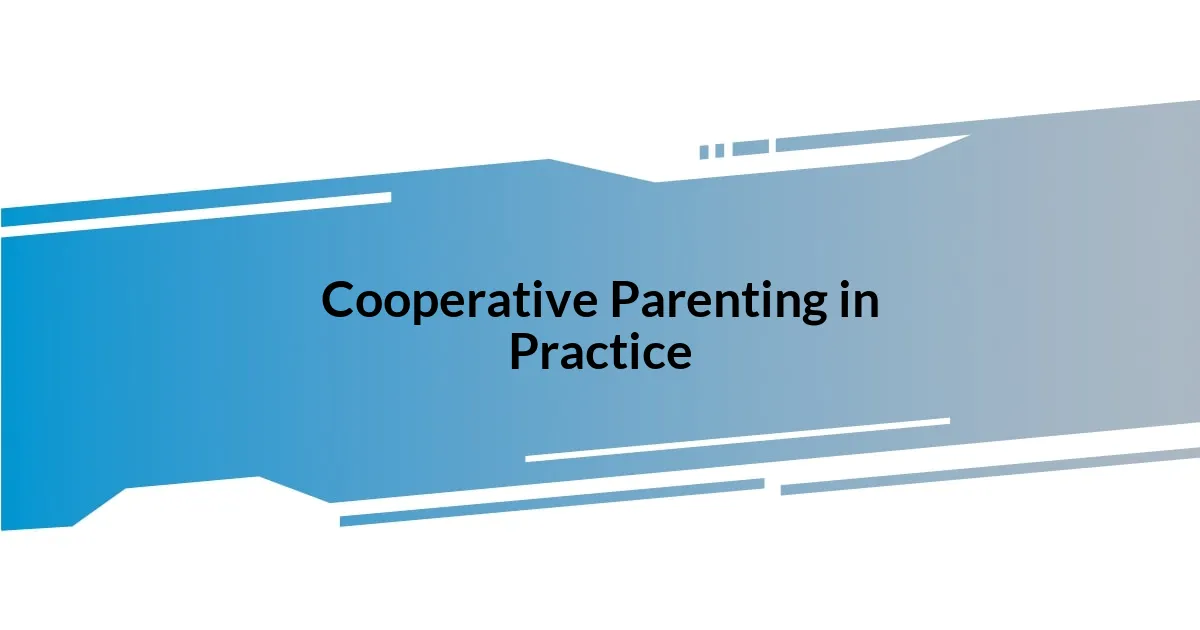
Cooperative Parenting in Practice
In my experience, implementing cooperative parenting takes a lot of intentional practice. I recall a family outing where my co-parent and I had to make a snap decision about where to eat. Instead of letting our preferences clash, we paused to consider the kids’ choices first. I remember the joy on their faces when we picked the place they loved, which made me realize how empowering it can be to prioritize the children’s happiness. Do you find joy in those little moments of teamwork?
Using shared calendars has also transformed our collaborative efforts. I set up a digital calendar where we can not only track the kids’ activities but also our commitments and family events. One evening, I was pleasantly surprised when I noticed my co-parent had blocked off time for a family game night. This prompted me to do the same for future weekends. Seeing our efforts synchronized created a comforting rhythm in our home. Isn’t it amazing how technology can enhance collaboration?
Celebrating wins, no matter how small, has become a vital practice in our cooperative journey. I remember a particularly challenging week when we finally aligned on bedtime rules after many discussions. We decided to reward ourselves with a movie night. This wasn’t just about the fun; it was an acknowledgment of our progress. Reflecting on those moments reinforces the idea that, even amidst struggles, nurturing our partnership can also promote a joyful environment for our children. How often do you take time to celebrate your collaborative achievements?
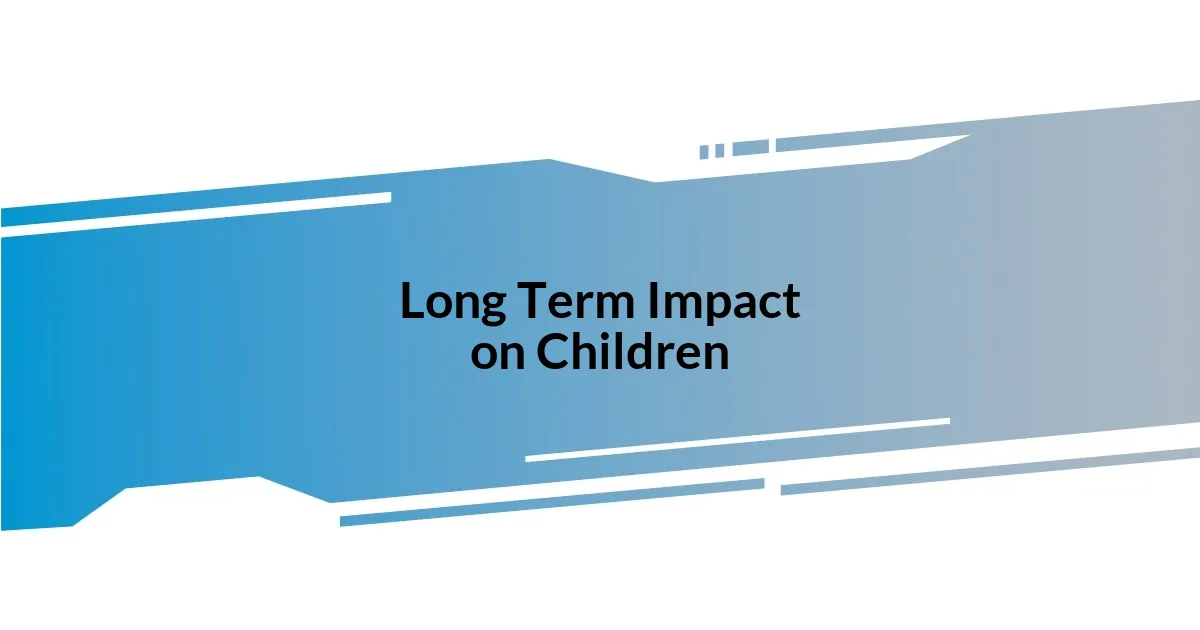
Long Term Impact on Children
The long-term impacts of cooperative parenting on children can truly shape their emotional and social development. I’ve noticed that my kids often model the collaborative behavior they’ve observed between their co-parent and me. For example, one morning during breakfast, my daughter settled a disagreement over the last pancake with a compromise rather than arguing. It made me realize that they’re absorbing lessons about teamwork and negotiation, skills they’ll carry into their future relationships.
Moreover, I can’t help but reflect on how monitoring our communication styles benefits our children’s well-being. When we resolve our conflicts constructively, I’ve seen my son open up more about his feelings—something he used to shy away from. By fostering a safe environment for emotional expression, we are instilling resilience and empathy in him, qualities that will serve him throughout his life. Isn’t it fascinating how our actions as parents can ripple through our children’s lives?
Finally, cooperative parenting has undoubtedly influenced the way my children approach friendships. There have been times when I overheard my little one comforting a friend who was feeling left out, and I couldn’t help but feel proud. It’s heartwarming to recognize that by co-parenting effectively, we’ve given our kids not just a stable environment, but the tools to build meaningful connections. Have you noticed similar positive changes in the interactions of your own children?